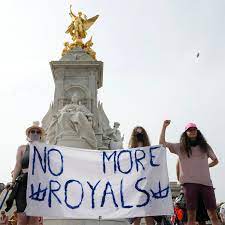Andrew Mitrovica
By now, the British monarchy ought to have been put into hospice care. It would, at the least, be a merciful end to a spent, vacuous institution that has revealed itself to be a dying artefact of a merciless, imperialist past that should be buried – once and for all. Despite the determined efforts of “royal” historians and “journalists” who embarrass themselves and the profession they purport to serve, the long, inevitable decay-into-irrelevant farce of King Charles III and trifling company was made plain, yet again, on the first anniversary of Queen Elizabeth II’s death last week.
Beyond her divided family and craven constituents who, by nostalgic temperament and career necessity, prostrate themselves before the grandeur of a glittery anachronism, few others noticed that, unlike many of her less fortunate ancestors, a stooping old lady’s 70-year reign had ended a year ago of natural causes. At the time, an army of sentimentalists assured us that Elizabeth’s quiet grace and singular longevity had left a profound, indelible mark throughout a Commonwealth paralysed by grief at the sad departure of the only queen most had ever known.
Turns out, Elizabeth’s decade after decade after decade tenure as monarch was as ephemeral as a gust of wind and, truth be told, much less serious than the results of that weekend’s Premier League fixtures. Sure, there were the familiar TV-friendly rituals confirming that Elizabeth had, in fact, been remembered. But they seemed tired and performative. A gaggle of Londoners were moved, of course, to place flowers at Buckingham Palace’s gates, while a thin crowd of celebrity-gawkers greeted Charles and a conga line of major and minor-league royals doing perfunctory “walkabouts” at commemorative church services. Later, the Prince and Princess of Wales took to social media to insist that: “We all miss you.”
Meanwhile, Prime Minister Rishi Sunak issued a bad speechwriter-penned statement to observe “the solemn anniversary”. “With the perspective of a year, the scale of her late majesty’s service only seems greater,” he said. “Her devotion to the nations of the United Kingdom and the Commonwealth only seems deeper. And our gratitude for such an extraordinary life of duty and dedication, only continues to grow.” At the risk of inviting a torrent of insults aimed at my blind, heartless self, I am at a loss to understand who constitutes this imaginary “we” that “all miss” the ridiculously rich, pampered-for-life queen? I don’t. Honestly, do you? As for Sunak’s claim that the “scale” of Elizabeth’s service, duty and dedication has only deepened in the 12 months since her passing at age 96, I challenge anyone to provide even a scintilla of tangible, not rhetorical, evidence to support this predictable bit of absurd historical revisionism.
Elizabeth devoted her comfortable life to travelling first-class, shielding her family’s vast wealth from the taxman, managing her family’s pristine, sprawling estates, being feted at lavish state dinners by virtue of luck and primogeniture, caring for her dear dogs and horses, and burnishing the mirage that the British monarchy remains an exemplar of constancy, charity and benevolence. Stripped of all the silly embroidery, her eldest son’s job is to do precisely the same. Royal historians quoted recently have admitted as much. Charles’s assignment is not to rock the gilded boat, but to keep it afloat. “He really has set a very neutral course. I think many people were expecting a lot of reform, a lot of change, in the way that he had advocated for as Prince of Wales,” one starry-eyed royal commentator told the Canadian Broadcasting Corporation. “But I think really keeping things balanced has become his hallmark, keeping things uncontroversial and keeping the institution stable.” The trouble is, the boat is rusting and listing – badly.
Charles’s ascendency to the throne has inspired scant, if any, enthusiasm. Support for the let’s-play-dress-up-on-a-balcony pantomime, already slipping under Elizabeth’s dynasty, has continued its precipitous fall. This is the telling case, particularly among British teenagers and 20-somethings who have informed pollsters that a sizeable majority of them don’t believe the Crown does any “good” and it’s time that their little island finally became a republic – proving that, sometimes, maturity has little to do with age. Charles is the head of a pedestrian, dysfunctional family that seethes with petty grievances, jealousies and contempt. The House of Windsor’s supposed devotion to “service” is a fig leaf meant to disguise just how inconsequential and disconnected “The Firm” is from the taxing, day-to-day lives of most Brits. The family’s frivolous squabbles – both public and private – take up a lot of time and energy even as they paid “solemn” remembrance to their beloved “grandmama”.
The simmering hostilities between Harry and his older, more obedient brother, William, erupted after the exiled-to-California prince visited, unannounced, his grandmother’s grave at Windsor Castle to offer his respects. This is how one astonished “royalist” correspondent described Harry’s unforgivable faux pas: “Prince Harry dramatically upped the ante in his war with the royal family Friday as he upstaged his estranged brother Prince William by making a shock visit to his grandmother Queen Elizabeth II’s grave on the first anniversary of her death.”
Happily, the Princess of Wales – Kate Middleton – came to the PR rescue. The Independent reported that, in touching homage and “poignant tribute” to the late queen, the princess sported a “family heirloom…[stepping] out in drop-down pearl earrings as an ode to Her Majesty.” Apparently, saccharine-laced copy extolling The Firm’s endearing virtues is not the exclusive purview of Fleet Street’s monarchy-mad tabloid press. My goodness. Is it any wonder then that appetite to continue to tolerate the often surreal, always wacky British version of Family Feud is waning – quickly?
The wise citizens of Barbados, among others, have had their fill of the travelling colonial circus. More importantly, they are no longer content to forget or forgive the conquering, plundering and crimes against humanity committed in the name and profit of an English king or queen. Instead, they have severed their once-binding ties with the so-called “Motherland” and are demanding restitution from the white plantation owners who stripped them, by lethal force, of freedom, independence and agency to govern their lives and futures. Alas, I’m still waiting for my home – Canada – to grow up, too, and follow Barbados’s fine and laudable example.
Aljazeera







